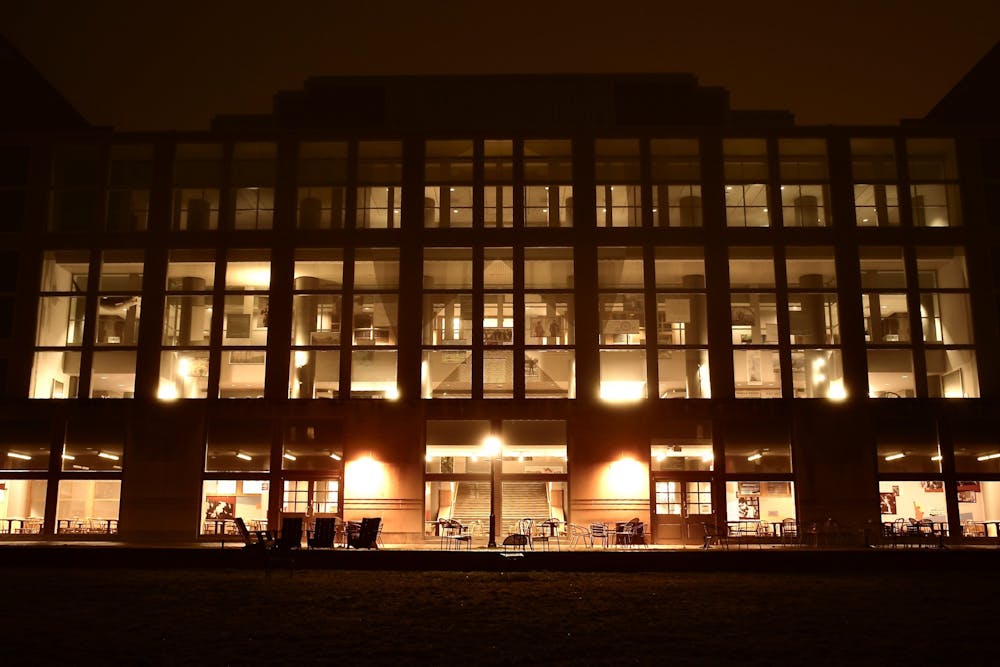Last semester, Remy Reya ’21 wrote about the loss of peripheral community in a fully virtual environment. Returning to campus, I expected a revival of meaningful interactions beyond our inner circles. However, while there have been more chance encounters and catch-ups with friends we haven’t seen for a year, something is missing; campus still feels lonely.
COVID-19 restrictions have all but eliminated the easygoing, incidental encounters that were central to campus life. Having a meaningful interaction with someone now requires us to commit to a meal, hangout, or another predefined activity.
Unfortunately, with this commitment comes the effort of opening up to someone we may not be close to and the risk of not “clicking” or enjoying the time spent with them. And, as a result of this risk, we might choose to engage deeply with our closest friends and limit our interactions with others to a polite “hello” whenever we run into them.
Taking that approach is a mistake. Although the limitations of campus life preclude the incidental interactions that past semesters offered, we can — and should — adapt our behavior to recreate the intermediate space between acquaintanceship and friendship that we’ve lost to the pandemic.
I’ve grappled with why intermediate interactions are so hard to create this semester, and the reason I’ve found is that they are usually anchored to an activity, social event, or place. In past semesters, we planned our days around events: going to class, attending meetings, getting meals, and participating in organized social activities. When we didn’t have scheduled commitments, we made the choice of where to be — to study in Frist Campus Center, hang out in an eating club or common area, or return to our dorms. Interactions naturally flowed from these events and settings: we might catch up with someone after precept, sit down with a long-lost friend from Community Action at lunch, or have an extended conversation with someone while waiting in line on the Street.
This semester, the impromptu brunches, debates after a seminar, dance shows, and nights out are gone. Now, having any meaningful interaction means planning social engagements — who to invite, when and where to meet, and what to do — days in advance. Any time that isn’t filled with these meticulously planned hangouts is “dead time”: time spent in a dorm working and attending Zoom meetings or in public spaces devoid of the life that once characterized them.
It is true that in past semesters we often made plans with specific people, whether those were group dinners with friends or the occasional meal with an acquaintance. However, as important as those planned interactions were, the incidental ones, flowing from the events and places that defined our schedules, played a similarly significant role in our social lives. Incidental interactions were also different from planned ones: they did not require any prior commitment and were usually attached to something familiar, such as an interest, activity, or group of people. They were low-risk.
In the absence of low-risk interactions, social engagements on campus now lie at two extremes: planned meetings with our closest friends — long walks around campus, dinners on Nassau, and hangouts in each others’ dorms — and friendly encounters with close acquaintances that usually last no longer than a few minutes.

The intermediate interactions, the low-risk ones — unplanned lunches, group conversations with professors after class, and late night study sessions at the library — are virtually nonexistent. Although these interactions may seem inconsequential in the moment, they are our best opportunity to interact with people who are more than acquaintances but not quite friends, and they often serve as the crucial bridge to friendship. They create the nebulous idea of “community” that many of us sought to return to this semester.
The urgency of creating community is clear. Last month, Columnist Hannah Reynolds wrote about how isolation on campus impacts mental health and about the pervasiveness of expressions of loneliness on platforms such as Tiger Confessions #. Last week, Director of Counseling and Psychological Services Dr. Calvin Chin noted in an email that CPS visits are up six percent compared to this point a year ago.
On a campus that can feel so isolating, it’s worth remembering that many of us are mere minutes away from each other. We can create a campus community if we make the effort, and we owe it to each other to do so.
This could start with spending more time working in public spaces such as Frist and stopping to talk to people we run into more often. Student group leaders can also help by facilitating interactions between members. Small “pods” that meet outdoors for appropriately distanced hangouts or group chats to set up spontaneous walks on campus can revive social opportunities that have been lost to remote learning. Of course, in creating these opportunities, it is imperative that groups adhere to public health guidelines and the Social Contract.

The most impactful thing we can do, however, is to simply reach out to someone who is not close to us. This person could be a new member of a student group, an acquaintance we want to know better, or a friend we haven’t spoken with for a year. This outreach will be risky as it will require us to engage with people beyond our immediate friend circles without incidental interactions to ease us into it. However, accepting this risk is critical to creating some approximation of a campus community this semester.
Campus may lack its packed lecture halls, bustling hubs, and usual festivities this semester, but we can still create a community here. Despite the challenges of this semester, there’s one thing that we do have: each other. Let’s not forget that.
Allen Liu is a junior from Chattanooga, Tenn. He can be reached at afliu@princeton.edu.








